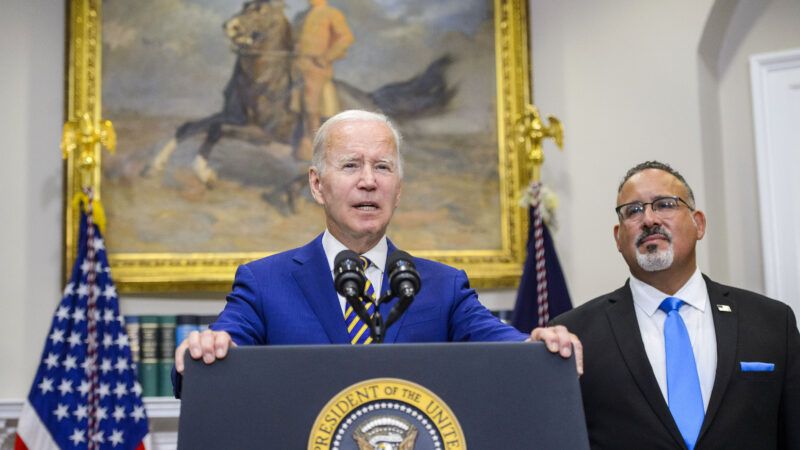No, PPP Doesn't Justify Biden's Student Loan Bailout
The proper response to one failed bailout is not another bailout of a different group.

Let's be very clear about one thing up front: The federal government's Paycheck Protection Program, which effectively paid businesses to keep workers on their payroll even if they temporarily closed during the COVID-19 pandemic, was a mess.
After quickly burning through its initial allocation of $349 billion, the Paycheck Protection Program was reauthorized a few times and ended up costing more than $820 billion, making it one of the largest components of the federal government's humongous COVID relief effort. Despite being lauded by both Democrats and Republicans, independent analysis found that the program was a hugely expensive failure. Only about one-third of the program's money actually went to workers who would have otherwise lost their jobs, according to a National Bureau of Economic Research study. Another study by the Federal Reserve Bank of St. Louis found that taxpayers paid roughly $4 for every $1 of wages and benefits to workers.
That is, to put it mildly, not the kind of government program that should serve as a model for other policies.
And yet, advocates for the student loan forgiveness program announced by President Joe Biden this week keep bringing up the Paycheck Protection Program as if it somehow justifies this latest expensive government bailout. It started, as most stupid arguments do, on Twitter, where progressive activists, advocacy groups like the Center for American Progress, and lawmakers like Sen. Bernie Sanders (I–Vt.) made the comparison in various ways. "If we could afford to cancel hundreds of billions in PPP loans to business owners in their time of need, please do not tell me we can't afford to cancel all student debt for 45 million Americans," Sanders tweeted on Tuesday.
That's a silly argument, of course. The federal government can afford to do a lot of things. Governing is about setting priorities; deciding which things are both affordable and worth doing.
By the end of the week, however, the White House had adopted the Paycheck Protection Program comparison as a key talking point in defending the student loan bailout. Over the past two days, the White House's official Twitter account has called out Republican members of Congress who received Paycheck Protection Program loans and later had those loans forgiven.
Yes, it's admittedly fun to watch Rep. Marjorie Taylor Greene (R–Ga.) get dunked on, but this comparison wouldn't make much sense even if the Paycheck Protection Program had been a success—which, again, it wasn't.
For one, the loans were a response to an unexpected emergency, and they were intended to make whole individuals who were put out of work, in many cases, by the government's own decision to force businesses to close. As you're probably aware, the government does not force anyone to take out a student loan. (In fairness, the federal subsidized loan programs do create bad incentives for borrowers, but that's not quite the same.)
Additionally, the loans handed out by the Paycheck Protection Program and subsequently forgiven were a temporary thing. If the analogy to student debt relief is accurate, then the government would have to also stop handing out discounted student loans that have warped the marketplace and created this entire mess. That would be a good idea! Too bad it isn't happening.
Instead, Biden has announced a series of changes in how future loan repayment will work that could unspool into a major disaster for colleges and students by causing schools to hike tuition to astronomical levels. Even progressive policy wonks like Matt Bruenig are already expressing concern about this possibility.
The Paycheck Protection Program might have been a wasteful exercise, but the fact that it was a temporary program meant that it did not create ongoing perverse incentives in the marketplace. A business owner couldn't keep her business closed indefinitely and collect ever-larger loans under the program, but colleges will absolutely raise tuition prices and keep collecting growing piles of money from students getting government-subsidized loans—heck, that's what colleges have been doing for years.
Still, probably the most important failing of this comparison is what I covered at the very top of this post. The Paycheck Protection Program was a mess! Yes, Taylor Greene and other members of Congress got huge loans that they didn't have to pay back as part of the federal government's bloated and wasteful COVID emergency measures. You should be outraged about that. But the proper response to one failed bailout is not another bailout.
At its core, this comparison of the Paycheck Protection Program to the student loan forgiveness program boils down to "someone else got free money, so I deserve free money too." That's the sort of logic you'd expect from a toddler, not from anyone who ever aspired to attend college and certainly not from the White House's official messaging apparatus.



Show Comments (53)